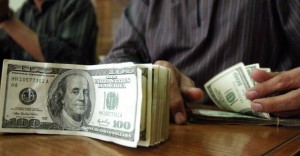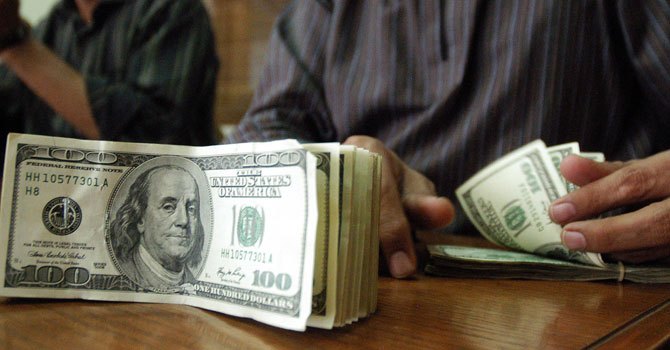
(AFP Photo)
By Nada Badawi
The US dollar has hit a new high against the Egyptian pound on the black market, weeks after hitting 7.60 to 7.85 against the Egyptian pound as official exchange rates stabilised at EGP 6.83 to the dollar.
The fall in the value of the Egyptian pound reflects a dwindling supply of US currency in the country.
Banking experts expect a further decline in the coming months, unless additional hard currency enters the market.
“We can see that Hisham Ramez’s policy to curb the slide in the foreign reserves did not work, as expected,” said Magdy Tolba, financial and economic expert, in reference to the dollar auction initiated by the central bank governor last December.
In an attempt to curb a run on the pound, which has fallen by 9% against the US dollar since last December, the Egyptian Central Bank has hosted dollar auctions to halt the sale of foreign currency.
The auctions are aimed at rationing Egypt’s supply of dollars and giving priority to staple food imports.
As a result, companies have turned to open markets to fund imports and other common business activities.
Tolba cited “ineffective policies” adopted by Minister of Supply and Internal Trade Bassem Auda to import supplies amid dwindling foreign reserves, as well as policies made by governor Hisham Ramez.
“The auction that that bank initiated is not enough, considering the low tourism revenues, protests and low export figures,” he said.
Egypt’s foreign reserves, which stood at $36bn on the eve of the 25 January Revolution, dropped to a critical low of $13.5bn at the end of February, which experts said was barely enough to cover three months of imports.
However, the central bank released a conflicting statement a week ago saying that the “foreign currency levels have not declined significantly in March” although the country used $1.3bn for imports to purchase basic commodities such as food and oil.
Egypt is also aiming to cut its budget deficit in order to secure the proposed $4.8bn International Monetary Fund loan to help its ailing economy.
The black market for dollars has been thriving since the Egyptian pound slumped against the US dollar, which left little foreign currency for exchange.
Inflation is accelerating as the value of the Egyptian pound weakens against a backdrop of negative economic indicators and continual political unrest.



